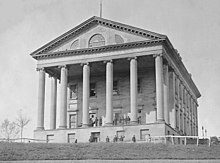Career

As an adult following the American Civil War, Watson spent the five years of his life as a freedman promoting African-American schools and churches in Mecklenburg. [2]
In 1867, Watson was elected to the Virginia Constitutional Convention of 1868. A Republican, he was the sole delegate elected from the central Piedmont convention district made up of his home Mecklenburg County. [3]
Following the Convention, Robinson was subsequently elected to the Virginia House of Delegates for the session 1869/70. [4]